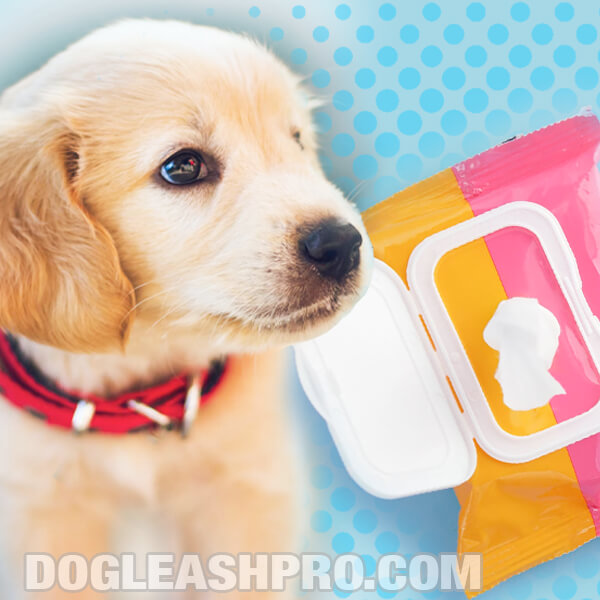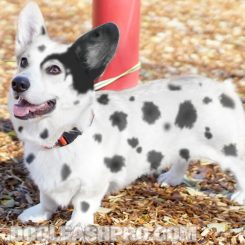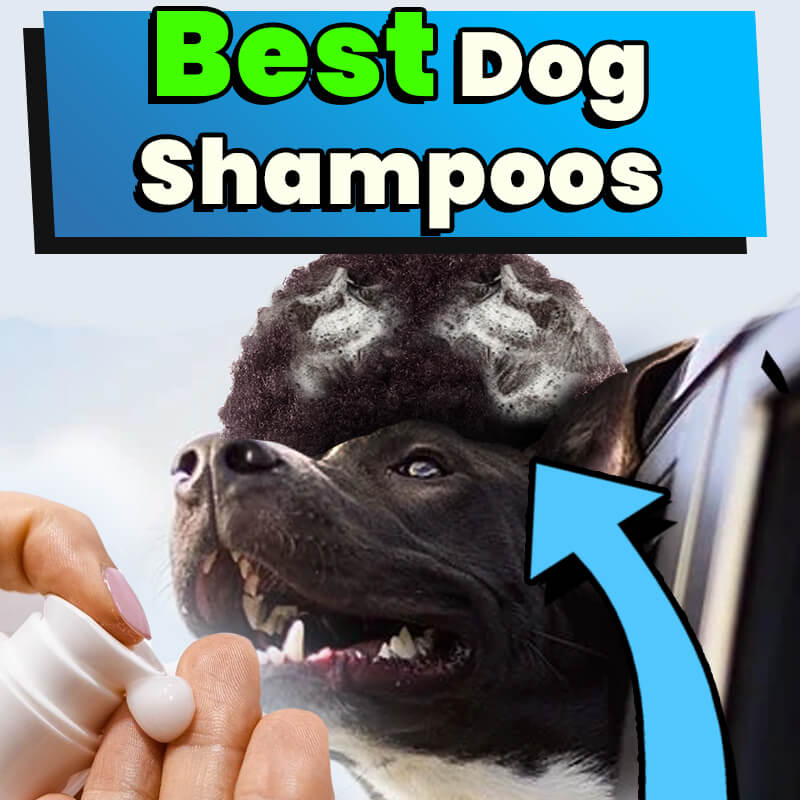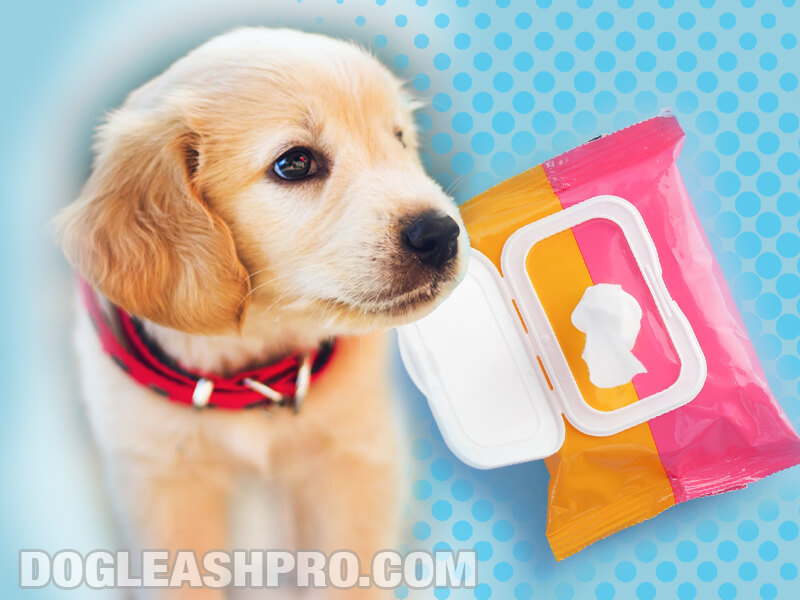
Do you find yourself using Baby Wipes on your dogs out of convenience? You’re not alone. Most dog owners with a family and kids will resort to using Baby Wipes to clean their dog’s eyes, face, paws, ears, or tush after a long walk or play outside. But you may be wondering, “Can I use Baby Wipes on my dog?” Here’s the short answer first.
Can you use Baby Wipes on Dogs? No, you should not use Baby Wipes on your dogs or puppies. For quick daily cleaning of your dog’s face, eyes, paws, ears, or bottom, Baby Wipes aren’t the best wet wipes to use because they are not canine-friendly and may contain ingredients that could harm your dogs. Thus, it’s best to keep Baby Wipes as well as other human wet wipes away from your canine companions.
Table of Contents
Can I use Baby Wipes on my dog?
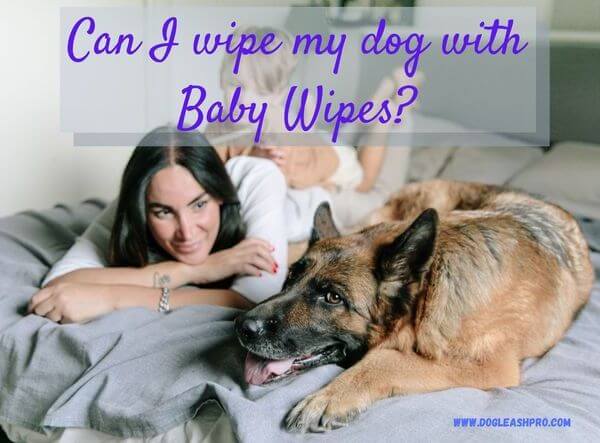
No, you should not use Baby Wipes on your dog because Baby Wipes were not specially made or designed to clean your dog’s face, eyes, paws, ears, or bum while maintaining the natural pH level of his or her skin.
Keep in mind that the pH level of our dog’s skin is different from that of a human’s skin. Baby Wipes were designed and made for babies and humans. They were not made for our canine companions.
If you repeatedly and routinely use Baby Wipes on your furry friends, their skin or paw will become itchy, dry, irritated, red, and may even be prone to infection. That’s because the continuous use of the Baby Wipes on your dog could disrupt the balance of his skin’s natural pH level.
When the dog’s skin becomes irritated, your canine friends will likely try to lick the affected area or try to bite or nip at it due to the itchiness. This will only cause more dryness and irritation which will worsen the condition of the affected skin.
Fun Fact: Dogs also tend to lick or bite their wounds when the wounded skin becomes itchy or painful. Check out Can You Use Bactine On Dogs? to find out if this anesthetic and antiseptic can help with skin pain and itching.
Baby Wipes for Dogs: Why you should not use Baby Wipes on Dogs
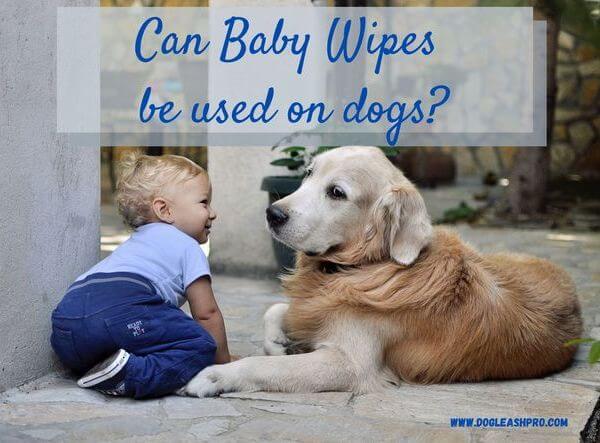
Since Baby Wipes or other human wet wipes were not made for canine use, it’s important to keep in mind that not all of them are tested for your dog’s safety. Sometimes what works for us may not work for our four-legged friends.
It’s just like how some food we eat, say the delicious lasagna or jelly beans, may be safe for us but extremely dangerous, if not toxic for our K9 friends (check out the linked post to find out why!).
So, to fully understand why you should not use Baby Wipes on dogs, we need to take a closer look at the Baby Wipes themselves, such as what they’re made of and the ingredients in Baby Wipes that make them unsafe for doggy use.
Are Baby Wipes safe for dogs?
Baby Wipes are not safe for dogs to use because they were not manufactured for canine use. This also means they may not be tested for your dog’s safety.
In fact, Baby Wipes contain ingredients and chemicals that may be dangerous for dogs.
Some of these toxic ingredients and chemicals include:
- Propylene glycol.
- Phenoxyethanol.
- Parabens.
- PEG’s (Polyethylene glycols).
- Phthalates.
- Methylisothiazolinone (MIT).
- Sodium Lauryl/Laureth Sulfate (SLS).
- Polysorbate-20.
- Triclosan.
- Butoxy PEG-4 PG-Amodimethicone.
- Bronopol.
- DMDM hydantoin.
- Fragrance or perfume.
Let’s go over each of these individually and see how they can affect your dogs.
Propylene glycol in Baby Wipes can lead to central nervous system damage in dogs
It’s quite common to see this chemical in Baby Wipes. Propylene glycol is an irritant and an enhancer which means it aids other ingredients in the Baby Wipes to seep more deeply into the skin in order to maintain moisture.
If you use Baby Wipes that contain propylene glycol on your dog every day and he has a tendency to lick his skin or fur right after you use it, then it could lead to central nervous system damage.
If you believe your dog has ingested high doses of this chemical and he’s having behavioral issues, we highly recommend that you consult with your vet to see if the Baby Wipes may be the cause of this.
Before you use that Baby Wipes on your dog again, check the ingredients section and see if it contains this chemical. If the Baby Wipes do contain propylene glycol, it’s best to avoid using them on your dog every day.
Occasional or rare use of Baby Wipes with this chemical on your dog should be fine, but definitely not every day or multiple times a day as this could lead to ingesting high doses of propylene glycol and can cause poisoning.
Phenoxyethanol in Baby Wipes is an irritant that is harmful to dogs with skin sensitivity
Recently, more and more people have realized the harmful effects of parabens in products like Baby Wipes and this has led many manufacturers to use phenoxyethanol as an alternative to parabens.
However, phenoxyethanol is just as harmful since it is an irritant. Using Baby Wipes (that contain phenoxyethanol) on your dog can cause mild skin irritation so please keep these Baby Wipes away from dogs if they have skin sensitivity.
According to the U.S. Food and Drug Administration (FDA), you should not use Baby Wipes around the mouth if they contain phenoxyethanol. In addition, the FDA added that this preservative can also depress the central nervous system in babies so imagine the harm it can cause on your canine friends.
Parabens in Baby Wipes can cause an endocrine interruption in dogs
As mentioned above, paraben is a preservative and it does more harm than good. You’ll know that it’s a paraben when the ingredient ends in “paraben.” Some common ones are:
- Butylparaben.
- Ethylparaben.
- Methylparaben.
- propylparaben.
It’s best to avoid using Baby Wipes that contain any form of paraben because they are endocrine disruptors that can cause an endocrine interruption in dogs and interfere with the body’s hormones.
Once it dries up, you can expect some of that chemical residue from the Baby Wipes to sit on your dog’s skin and fur.
Now imagine how many times a day your furry family member licks his paws, body, and even his bottom (because my Chihuahua does!) to keep himself clean. While licking himself, he will most likely ingest some of the above-mentioned chemical residues that were left behind by the Baby Wipes.
Are Baby Wipes ok for dogs?
On rare occasions when you run out of doggy wipes and all you have left are Baby Wipes, then cleaning your furry friends with them is fine. However, daily use of Baby Wipes on your dogs can lead to health issues.
That’s because if you clean your dogs with Baby Wipes every day, then they are exposed to the chemicals and the residue every day.
Not only are the chemicals sitting on your dog’s skin and coat, but they could also get absorbed and enter into your dog’s blood system. It’s also natural for dogs to lick their skin, paw, and fur throughout the day and they will likely ingest these chemicals as well.
While ingesting and being exposed to these chemicals found in your typical Baby Wipes are fine in small amounts and in rare occasions, constant and daily exposure to the chemicals from the Baby Wipes are not ok for dogs.
When dogs ingest large doses of the chemicals found in the Baby Wipes, it could lead to several health problems.
This is why it’s best to err on the side of caution and avoid using Baby Wipes to clean your dog’s face, eyes, ears, paws, and bottom.
Instead of Baby Wipes, go with dog wipes instead.
So, are Baby Wipes good for dogs?
As we can see, Baby Wipes are not good for dogs.
First, it’s not specially made with our canine friends in mind, which is why they call it Baby Wipes and not Dog Wipes and due to this, they were not tested for dog safety. This means the Baby Wipes are not canine-friendly.
Second, the ingredients in your typical Baby Wipes may be harmful to our dog’s skin and coat.
Third, our canine friends are at risk of poisoning or health problems when they lick their skin right after you wipe down their coat, skin, or paws with the Baby Wipes. Even after it dries up, your pooch can still ingest the chemical residues that are left from the Baby Wipes.
DISCLAIMER: THIS WEBSITE DOES NOT PROVIDE MEDICAL ADVICE
The information, including but not limited to, text, graphics, images and other material contained on this website are for informational purposes only. No material on this site is intended to be a substitute for professional veterinary advice, diagnosis, or treatment. Always seek the advice of your veterinarian or other qualified health care provider with any questions you may have regarding a medical condition.

With over five years of specialized experience as an animal writer, my expertise lies in dog nutrition, health, behavior, grooming, and training. I am dedicated to delivering helpful and informative content that caters to the well-being of our furry friends. My primary goal is to empower pet owners with knowledge and ensure our canine companions thrive in health and happiness. In my free time, I love volunteering at local dog rescue centers.
